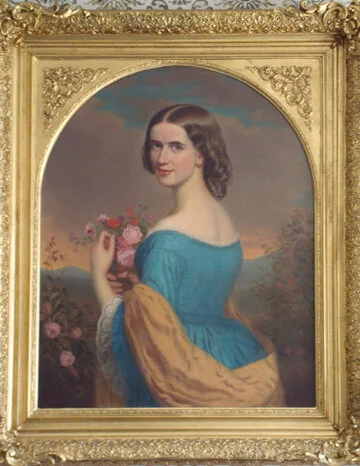Questions Abound: Solomon Woodward and the Women’s Mill Strike
By Jennie Shurtleff
Sometimes when studying history, we can’t find an actual answer. While it can be unsatisfying not to know exactly what happened, it also tacitly encourages us to ask questions and use our own judgement to determine likely scenarios. Such is the case with Solomon Woodward and the Women’s Mill Strike of 1866.
In 1866, Solomon Woodward was the owner of the woolen mill (current-day Woodstock Recreation Center) that was located in the western part of the Village on the Ottauquechee River. Woodward was wealthy, industrious, and well known. An address published at the time of his funeral service, on May 3, 1879, states with regard to Mr. Woodward:
This man, who for so many years held an important and leading position in the business interests of the town of Woodstock, deserves something more than the simple announcement of his death as he passes away forever from the scene of his usefulness and his industries. For nearly thirty years, during the period of one generation, the hum of industry in our village was mainly kept in activity through his instrumentality. The laboring man ever found in him a friend, the poor man a benefactor, and his acquaintances all, a most genial and trusted companion. He was proverbial alike for his integrity and for his liberality. He was generally respected by all who knew him while living, and as generally lamented when dead.
The address goes on to note:
When his new grist and saw mill were built it was said they had no equal for completeness of equipment and excellence of work in our State. It was simply his own downright honesty and integrity of character carried into every department of life and business over which he had control.
While Mr. Woodward’s accomplishments were many in that he is credited with having revived the ailing mill and having turned it into a robust manufacturing facility, there is a slight blot on his reputation dating some thirteen years before his death. This blot revolves around a strike at his woolen mill.
Detail taken from the Presdee and Edwards Map (circa 1850s) showing the Solomon Woodward Woolen Mill. The mill complex was extensive and included saw and grist mills as well as the woolen mill.
The year was 1866, about a year and a half after the final shots of the Civil War had been fired. Mr. Woodward had purchased the mill nineteen years earlier, in 1847, and during his ownership, he added several double tenements, the stone wool house, and other outbuildings. He also built a magnificent mansion on Mountain Avenue, which is now frequently referred to as the Faulkner Mansion.
Solomon Woodward, posing with his daughter on her pony, in front of his mansion on Mountain Avenue. © Woodstock History Center.
The events revolving around the mill strike that transpired in October of 1866 have largely been obscured by the passage of time. In fact, the Woodstock History Center only has access to part of the story, which was printed in one of Woodstock’s local newspapers, The Spirit of the Age, on three successive weeks – October 4, October 11, and October 18. The October 18th commentary ends with a promise of continued reporting on the issue. Alas, we have not located the October 25 edition of the paper. Hopefully, at some point in the future, a copy of that newspaper will surface and provide some of the missing details of how the strike was resolved. In the meantime, the story of the mill “girls” is an interesting chapter in Woodstock’s history.
10/04/1866
A STRIKE. — The female operatives in Mr. Woodward’s factory, struck for the “ten hour system” last Wednesday. They worked half an hour over the usual time, consequently the “factory boarding house mam” refused to come down with the “bread and butter” because it was not the “rules of the house.” We learn that the girls proceeded in a body to the nearest hotel for supper, with the determination to have it charged to Mr. Woodward. We hope the girls will succeed in this much needed reform, and we think they will, for
When a woman wills, she will, you may depend on’t.
When she won’t, she wont, and there is an end on’t.
10/11/1866
THE STRIKE – The factory girls spoken of last week persistently refused to dance to Solomon’s tune of fourteen hours per day, and are determined to “fight it out on the line they have drawn. We admire their force of character, and public opinion sustains them in the movement. Mr. Woodward was out of town at the time of the “strike,” and the “bosses” acceded to the girls’ terms until his return. On his return he demanded “full hours,” which any reasonable man, a Southern Legree*, not excepted, must admit is too much for female endurance. Eighteen of the girls failed to “come to time,” left the mill, and marched to the office for their pay. Some of the supposed leaders in the movement were paid off and dismissed the works, the larger portion, however, were refused, probably with the hope that they will repent and go to work, and so matters stand at present. The girls are willing to work eleven hours for a day’s work, which is all that any humane man ought to expect, and if this is not satisfactory to Mr. Woodward’s vaulting ambition and ideas of physical power, he ought to settle up with the girls, and procure help South from among the “superior race,” for whom he pretends to have such fine feelings. We hope the girls will demand and receive justice in the matter.
“Let not ambition mock their useful toil.”
On Monday evening the girls, eighteen in number, enjoyed “ice cream” at Mr. Fairbank’s Hotel. “Mine hoste” of the Eagle who knows how to keep a hotel deal fair with the fair on this occasion and served up an excellent supper.
*Note: A “Legree” is a “cruel employer” or slave driver. The expression refers to a character in the novel Uncle Tom’s Cabin. Simon Legree beats Uncle Tom so harshly that Uncle Tom dies.
10/18/1866
THE STRIKE AGAIN—This is a fruitful theme – it is as susceptible of continuation as a Ledger story. Our paper carrier, last week, was refused admittance to the factory to serve our regular subscribers, a practice he has followed for some time, by W.C. Barnard, better known as Mr. Woodward’s man, “Friday,” but he is too small game for us to waste powder with. What we said in regard to the strike was all correct, and has been extensively copied in the State papers as an item of news. Mr. Woodward or any other man should not act so unbecomingly as to fear the publication of facts. We suppose this was what stirred this irascible little fellow to do as he did. Does he think he can stop the circulation of the AGE among the hands in this way? If he does, he has calculated without his host. He cannot reduce them to machinery in the light of the nineteenth century. Mr. Woodward’s looms stand idle, and he refuses to settle up with the girls, or to accede to their demand of eleven and a half hours for a days work. What does he mean? Is he honest?
One of his hands informs us that he intends to present us with cloth for a suit of clothes – glad to hear it, he makes good cloth, but before he does it, we feel it our duty to inform him that we cannot alter the “preach” unless he treats the girls more humanely. We ask no favors, neither do we resort sycophancy to secure popularity with any man or any class of men. (To be continued next week.)
Portrait of Solomon Woodward’s daughter, Lydia Frances Woodward. Miss Woodward, in her blue gown holding roses, appears to have lived a life of privilege that was a far cry from that of the mill “girls” who toiled fourteen hours a day in her father’s mill. © Woodstock History Center
Clearly the sentiments of the newspaper were in support of the women in the mill who were laboring fourteen hours a day in noisy, dangerous working conditions with no temperature control (hot in the summer, cold in the winter). These women were originally asking for a 10-hour day, but then altered their demands to an 11 ½-hour day. Mr. Woodward, at least in mid October, was not amenable to this change in hours.
The three articles are also interesting in that they shed light on Mr. Woodward and tacitly call for further investigation. For instance, in the article of October 11, the author notes that Mr. Woodward “ought to settle up with the girls, and procure help South from among the ‘superior race,’ for whom he pretends to have such fine feelings.” Had Mr. Woodward been an abolitionist? Are the words in quotation marks (“superior race”) an actual quotation? Why does the author say that Mr. Woodward “pretends” to have fine feelings for this group? We may never know the answers to these questions which would certainly shed light on Mr. Woodward and provide a more three-dimensional picture of him.
A week later, in the article published on October 18, the unnamed writer notes: “One of his [Mr. Woodward’s] hands informs us that he intends to present us with cloth for a suit of clothes – glad to hear it, he makes good cloth, but before he does it, we feel it our duty to inform him that we cannot alter the “preach” unless he treats the girls more humanely.” Was Mr. Woodward trying to bribe the local press into more sympathetic coverage? Or was some unrelated offer made and taken out of context and the facts twisted? Again, at this time, there are more questions than answers.



